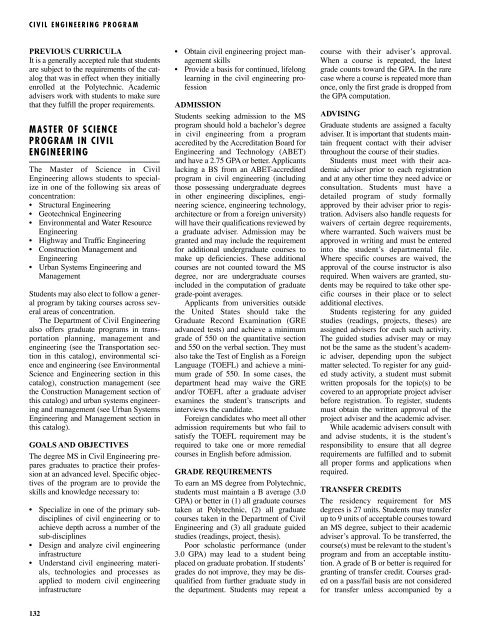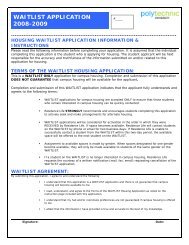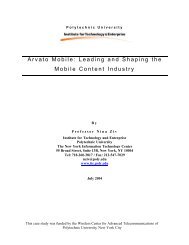POLYTECHNIC UNIVERSITY 2005-2007
POLYTECHNIC UNIVERSITY 2005-2007
POLYTECHNIC UNIVERSITY 2005-2007
You also want an ePaper? Increase the reach of your titles
YUMPU automatically turns print PDFs into web optimized ePapers that Google loves.
CIVIL ENGINEERING PROGRAM<br />
PREVIOUS CURRICULA<br />
It is a generally accepted rule that students<br />
are subject to the requirements of the catalog<br />
that was in effect when they initially<br />
enrolled at the Polytechnic. Academic<br />
advisers work with students to make sure<br />
that they fulfill the proper requirements.<br />
MASTER OF SCIENCE<br />
PROGRAM IN CIVIL<br />
ENGINEERING<br />
The Master of Science in Civil<br />
Engineering allows students to specialize<br />
in one of the following six areas of<br />
concentration:<br />
• Structural Engineering<br />
• Geotechnical Engineering<br />
• Environmental and Water Resource<br />
Engineering<br />
• Highway and Traffic Engineering<br />
• Construction Management and<br />
Engineering<br />
• Urban Systems Engineering and<br />
Management<br />
Students may also elect to follow a general<br />
program by taking courses across several<br />
areas of concentration.<br />
The Department of Civil Engineering<br />
also offers graduate programs in transportation<br />
planning, management and<br />
engineering (see the Transportation section<br />
in this catalog), environmental science<br />
and engineering (see Environmental<br />
Science and Engineering section in this<br />
catalog), construction management (see<br />
the Construction Management section of<br />
this catalog) and urban systems engineering<br />
and management (see Urban Systems<br />
Engineering and Management section in<br />
this catalog).<br />
GOALS AND OBJECTIVES<br />
The degree MS in Civil Engineering prepares<br />
graduates to practice their profession<br />
at an advanced level. Specific objectives<br />
of the program are to provide the<br />
skills and knowledge necessary to:<br />
• Specialize in one of the primary subdisciplines<br />
of civil engineering or to<br />
achieve depth across a number of the<br />
sub-disciplines<br />
• Design and analyze civil engineering<br />
infrastructure<br />
• Understand civil engineering materials,<br />
technologies and processes as<br />
applied to modern civil engineering<br />
infrastructure<br />
• Obtain civil engineering project management<br />
skills<br />
• Provide a basis for continued, lifelong<br />
learning in the civil engineering profession<br />
ADMISSION<br />
Students seeking admission to the MS<br />
program should hold a bachelor’s degree<br />
in civil engineering from a program<br />
accredited by the Accreditation Board for<br />
Engineering and Technology (ABET)<br />
and have a 2.75 GPA or better. Applicants<br />
lacking a BS from an ABET-accredited<br />
program in civil engineering (including<br />
those possessing undergraduate degrees<br />
in other engineering disciplines, engineering<br />
science, engineering technology,<br />
architecture or from a foreign university)<br />
will have their qualifications reviewed by<br />
a graduate adviser. Admission may be<br />
granted and may include the requirement<br />
for additional undergraduate courses to<br />
make up deficiencies. These additional<br />
courses are not counted toward the MS<br />
degree, nor are undergraduate courses<br />
included in the computation of graduate<br />
grade-point averages.<br />
Applicants from universities outside<br />
the United States should take the<br />
Graduate Record Examination (GRE<br />
advanced tests) and achieve a minimum<br />
grade of 550 on the quantitative section<br />
and 550 on the verbal section. They must<br />
also take the Test of English as a Foreign<br />
Language (TOEFL) and achieve a minimum<br />
grade of 550. In some cases, the<br />
department head may waive the GRE<br />
and/or TOEFL after a graduate adviser<br />
examines the student’s transcripts and<br />
interviews the candidate.<br />
Foreign candidates who meet all other<br />
admission requirements but who fail to<br />
satisfy the TOEFL requirement may be<br />
required to take one or more remedial<br />
courses in English before admission.<br />
GRADE REQUIREMENTS<br />
To earn an MS degree from Polytechnic,<br />
students must maintain a B average (3.0<br />
GPA) or better in (1) all graduate courses<br />
taken at Polytechnic, (2) all graduate<br />
courses taken in the Department of Civil<br />
Engineering and (3) all graduate guided<br />
studies (readings, project, thesis).<br />
Poor scholastic performance (under<br />
3.0 GPA) may lead to a student being<br />
placed on graduate probation. If students’<br />
grades do not improve, they may be disqualified<br />
from further graduate study in<br />
the department. Students may repeat a<br />
course with their adviser’s approval.<br />
When a course is repeated, the latest<br />
grade counts toward the GPA. In the rare<br />
case where a course is repeated more than<br />
once, only the first grade is dropped from<br />
the GPA computation.<br />
ADVISING<br />
Graduate students are assigned a faculty<br />
adviser. It is important that students maintain<br />
frequent contact with their adviser<br />
throughout the course of their studies.<br />
Students must meet with their academic<br />
adviser prior to each registration<br />
and at any other time they need advice or<br />
consultation. Students must have a<br />
detailed program of study formally<br />
approved by their adviser prior to registration.<br />
Advisers also handle requests for<br />
waivers of certain degree requirements,<br />
where warranted. Such waivers must be<br />
approved in writing and must be entered<br />
into the student’s departmental file.<br />
Where specific courses are waived, the<br />
approval of the course instructor is also<br />
required. When waivers are granted, students<br />
may be required to take other specific<br />
courses in their place or to select<br />
additional electives.<br />
Students registering for any guided<br />
studies (readings, projects, theses) are<br />
assigned advisers for each such activity.<br />
The guided studies adviser may or may<br />
not be the same as the student’s academic<br />
adviser, depending upon the subject<br />
matter selected. To register for any guided<br />
study activity, a student must submit<br />
written proposals for the topic(s) to be<br />
covered to an appropriate project adviser<br />
before registration. To register, students<br />
must obtain the written approval of the<br />
project adviser and the academic adviser.<br />
While academic advisers consult with<br />
and advise students, it is the student’s<br />
responsibility to ensure that all degree<br />
requirements are fulfilled and to submit<br />
all proper forms and applications when<br />
required.<br />
TRANSFER CREDITS<br />
The residency requirement for MS<br />
degrees is 27 units. Students may transfer<br />
up to 9 units of acceptable courses toward<br />
an MS degree, subject to their academic<br />
adviser’s approval. To be transferred, the<br />
course(s) must be relevant to the student’s<br />
program and from an acceptable institution.<br />
A grade of B or better is required for<br />
granting of transfer credit. Courses graded<br />
on a pass/fail basis are not considered<br />
for transfer unless accompanied by a<br />
132




